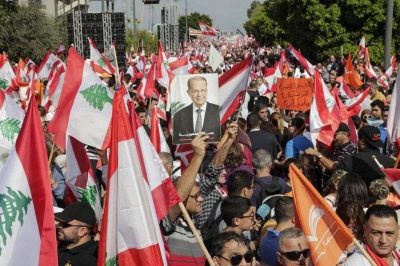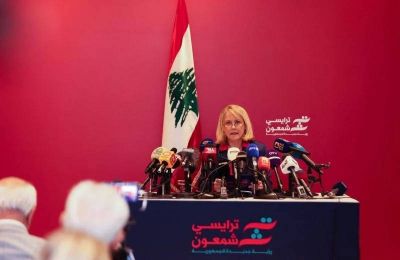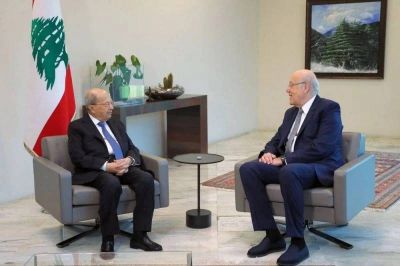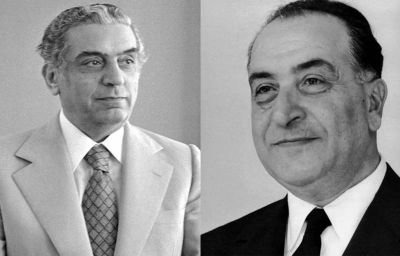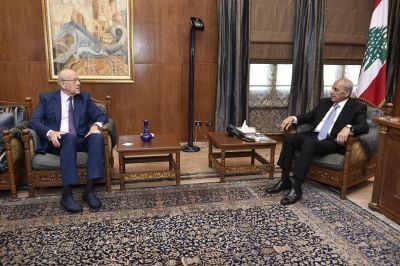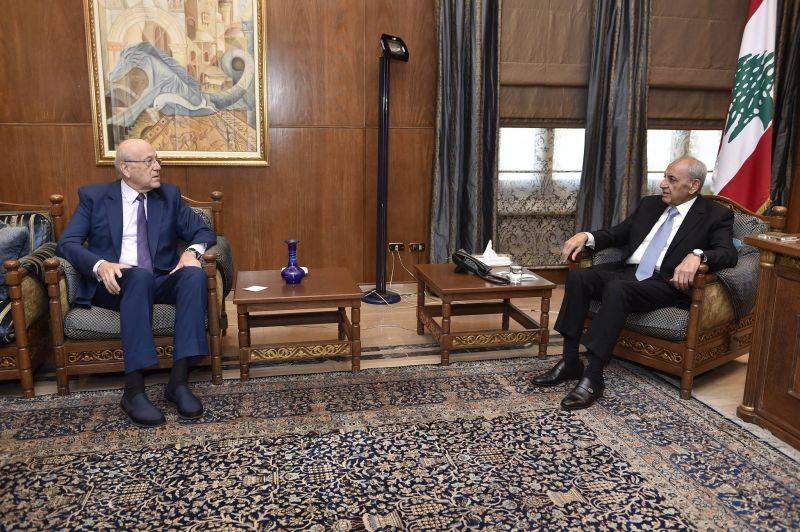
Prime Minister-designate Nagib Mikati met on Monday with Parliament Speaker Nabih Berri, in Ain al-Tineh. (Photo from Parliament's Flickr account)
Today, Aug. 31, the constitutionally mandated period begins to elect a successor for Michel Aoun, whose term in office will end in two months.
But in reality, there is no reason to believe that this milestone will be achieved without a hitch. Indeed, it appears that the country risks plunging, for the first time in its history, into a total vacuum in the executive branch — particularly since Aoun, contrary to accusations by his detractors, said he is determined to leave Baabda on Oct. 31.
The need to form a cabinet that has full powers is therefore pressing, a reality that Prime Minister-designate Najib Mikati seems to be aware of.
However, Parliament Speaker Nabih Berri does not seem to be in a rush. He has still not convened the first session to hold the presidential election, which according to the Constitution shall be held starting on Sept. 1.
“The head of the legislature has defined the characteristics of the next president needed by Lebanon. We need a unifier president who can have a dialogue with everyone,” Amal bloc MP Qassem Hashem told L’Orient-Le Jour.
Berri “expects reaching a broad agreement on such a figure. He will convene a Parliament session in due course,” said Hashem.
If so, it is not the adoption of certain reforms demanded by the international community that will prevent Berri from kicking off the presidential election, as he told journalists a month ago.
In any case, Berri will likely clarify the matter in his long-awaited speech tomorrow in Tyre, ostensibly held to commemorate the disappearance of Amal movement founder Imam Moussa Sadr.
‘This is not the time for whims’
In the wait to hear his greatest foe’s positions, Aoun appears to be reassuring those who have fears that he may stay in the Baabda Palace after Oct. 31 under the pretext that a caretaker cabinet cannot exercise the presidential powers, in case a new president is not elected Speaking to a delegation from the Audiovisual Media Workers Syndicate yesterday, Aoun once again washed his hands of the governmental impasse.
“While I seek to see a cabinet formed before the end of my term, some people continue to accuse me of blocking [this process],” the president said. “There are undoubtedly some hurdles, but the efforts have not stopped. Talks are still ongoing.”
The main obstacles in question are related to the lineup of the future team that could be required to run the country in the coming phase. The presidential camp had wanted to add six ministers of state to the caretaker cabinet to imbue the body with a more political character.
According to information obtained by L’Orient-Le Jour, this option was thrown out. Aoun was reportedly open to Mikati’s idea of maintaining a cabinet of 24 ministers, despite the latter’s dispute with the president and his son-in-law, Free Patriotic Movement leader Gebran Bassil.
Mikati went to Ain al-Tineh on Monday for a meeting with Berri, his number one supporter, who is pressing for the formation of a new ministerial team to omit any pretext that the president could use in order to stay in Baabda.
The government file was also on the agenda of a meeting between Berri and the Democratic Gathering Bloc leader Teymour Joumblatt.
What about Hezbollah in all this? The question is all the more pressing since local media outlets reported that the party is leading mediation between Aoun and Mikati. The latter reportedly held discussions on Sunday with Hezbollah representatives.
This information was denied by Hezbollah spokesperson Mohammad Afif. “We did not make any efforts in this direction. We are only giving advice to both sides,” he said.
This “advice” turned into a harsh reminder yesterday. “It is impossible for a country to have stability without a government. This is not the time for whims,” said Mohammad Raad, the head of Hezbollah’s parliamentary bloc, at a ceremony yesterday in Sarafand.
“[Reactivate] this cabinet so as to become a cabinet with full powers,” he said. The option of refloating the Mikati cabinet is no longer ruled out by Hezbollah, in the absence of an agreement on a new team.
Raad’s remarks are in line with a first warning expressed a few days ago by Hassan Nasrallah, who called for the rapid formation of a cabinet — a call that was interpreted as an indication of a presidential vacuum that is more likely going to last for a long period.
This article was originally published in French at L'Orient-Le Jour. Translated by Joelle El Khoury.
